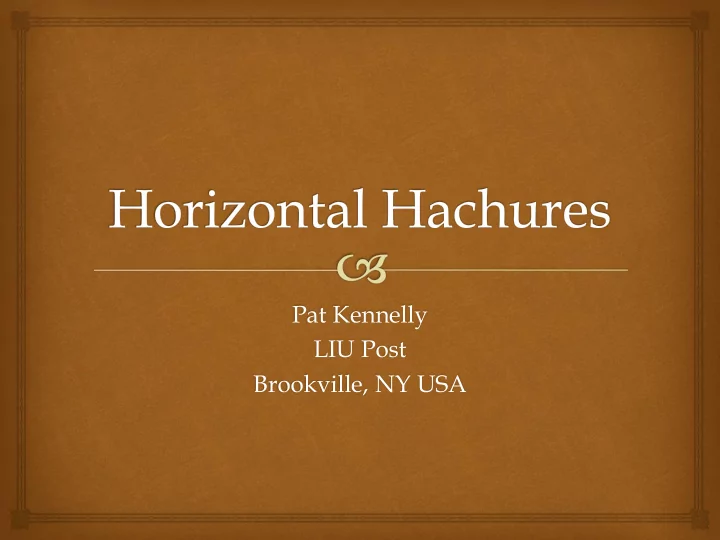

Pat Kennelly LIU Post Brookville, NY USA
Outline Definition Horizontal hachures vs. custom relief contours Methodology Results Summary
Definition From Cartographic Relief Presentation (Imhof, 1982) Horizontal hachures are more compactly and evenly arranged than contours In contrast to contours, no exact elevation value is assigned to the individual hachure line The thickness of horizontal hachure lines is not constant, usually following the principle of oblique lighting
Horizontal Hachures From Imhof (1982), figure 154, page 231
Custom Relief Contours Comparison with Horizontal Hachures
Horizontal Hachures vs. Custom Relief Contours Horizontal hachures Custom relief contours Compact and evenly Spacing based on contour arranged interval No exact elevation Contours drawn at round values assigned numbers (e.g. 10, 100 etc.) Thickness varies with Thickness and/or color vary oblique lighting effect with oblique lighting effect
Horizontal Hachures vs. Custom Relief Contours Horizontal hachures Illuminated contours Tanaka (1950) The Relief Contour Method of Representing Topography on Maps.
Horizontal Hachures vs. Custom Relief Contours Horizontal hachures Illuminated contours Pauliny map - Courtesy ETH Zürich (historic slide collection)
Horizontal Hachures vs. Custom Relief Contours Illuminated contours Horizontal hachures southwest illumination Pauliny (1892), Karte von Schneeberg, Raxalpe, und Semmering.
Horizontal Hachures vs. Custom Relief Contours Horizontal hachures Shadow contours Yoeli (1983) Shadowed Contours with Computer and Plotter.
Horizontal Hachures vs. Custom Relief Contours Horizontal hachures Shadow contours Landkarte des Kantons Thurgau (188?)
Horizontal Hachures vs. Custom Relief Contours Horizontal hachures Shadow contours Köpcke (1885) Ueber Reliefs und Relief- Photogramme
Other Custom Relief Contours Slope shading effect Oblique lighting effect? Bulletin of the American New Zealand Mapping Series #58 Arthur’s Pass map (1931) Geographic Society (1907)
Other Custom Relief Contours Localized contour removal - Loose rocks steep areas Mackaness and Steven (2006) An Algorithm for Swisstopo (in Jenny et al. (2014) Design Localised Contour Removal over Steep Terrain Principles for Swiss-style Rock Drawing)
Methodology
Methodology - Overview Use contours to create shading effect Create shading effect by varying number and spacing of contour segments as opposed to varying thickness or color of contours Avoid sharp edges to the contour segments that could be associated with using polygonal outlines to define the ends of contour lines
Methodology - Technique Begin with digital elevation model (DEM) grid Hillshade the DEM Convert grid cells of the DEM to points Contour the points at a small contour interval Buffer points using values smaller than the grid cell size and clip the contours Assign hillshade value to the clipped contours Iteratively buffer and clip the contour segments to create longer, more continuous horizontal hachures that are more closely spaced in more darkly shaded areas
Methodology – Site Example
Methodology DEM of Mt. Hood, Oregon, USA 26.3 meter grid cells Grid extent = 92 x 111 Contour interval = 1 meter
Methodology Buffered points with Buffered points all contours
Methodology Buffered points with all Contours clipped and contours those on point selected
Methodology Contours clipped and Buffered contour segments those on points selected base on hillshading value
Methodology Contours clipped and Buffered contour segments those on points selected base on hillshading value
Methodology Contours clipped and Buffered contour segments those on points selected based on hillshading value
Results
Results Horizonal hachures
Results Horizontal hachures with Horizontal hachures short segments eliminated
Results Horizontal hachures Horizontal hachures with hypsometric tinting
Results Horizontal hachures with Horizontal hachures short segments extended
Results Horizontal hachures Horizontal hachures with contours
Summary Horizontal hachures are one method of modulating contour lines to achieve relief shading This method of horizontal hachuring produces fine lines that provide both shading and texture The resulting contour segments benefit from traditional contours or hypsometric tinting that highlight the form of the terrain feature
Special Thanks Lorenz Hurni – ETH Zürich Bernhard Jenny – Oregon State University Geoff Aitken – NewTopo (NZ) Ltd.
Recommend
More recommend